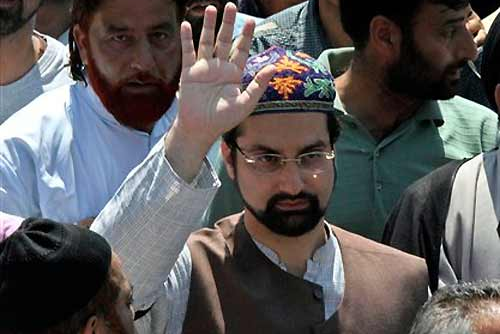Centre bans Awami Action Committee, J&K Ittihadul Muslimeen for 5 years; The Union government’s move to ban the two religious organisations for five years has evoked sharp response from Mirwaiz and former J&K chief minister Mehbooba Mufti terming the decision as “undemocratic.”
The Awami Action Committee (AAC), headed by Hurriyat chairman Mirwaiz Umar Farooq, and Jammu and Kashmir Ittihadul Muslimeen (JKIM), led by Shia leader Masroor Abbas Ansari, were on Tuesday banned by the Centre for their alleged anti-national activities, supporting terrorism and fuelling secessionist activities.
The Union government’s move to ban the two religious organisations for five years has evoked sharp response from Mirwaiz and former J&K chief minister Mehbooba Mufti terming the decision as “undemocratic.”
On Tuesday the Union Home Ministry banned Awami Action Committee (AAC) and Jammu and Kashmir Ittihadul Muslimeen (JKIM) as an unlawful association and banned both the organisations with immediate effect for a period of five years.
The Union MHA order accused both the organisations of indulging in unlawful activities that are prejudicial to the integrity, sovereignty and security of the country. The ban has evoked sharp response from Mirwaiz Umar Farooq who is also head priest of Jamia Masjid and condemned this ban.
Former J&K chief minister and president PDP termed this ban another blow to Kashmir’s social and political landscape and sought intervention from J&K government.
Summary
- Ban Announcement: The Union government has banned two religious organizations, the Awami Action Committee (AAC) and Jammu and Kashmir Ittihadul Muslimeen (JKIM), for five years under the Unlawful Activities (Prevention) Act (UAPA). The organizations were accused of anti-national activities, supporting terrorism, and fueling secessionist movements.
- Leadership and Allegations: The AAC is led by Mirwaiz Umar Farooq, a prominent cleric and Hurriyat Conference chairman, while JKIM is headed by Shia leader Masroor Abbas Ansari. Both groups were accused of mobilizing funds for unlawful activities and promoting secessionist ideologies.
- Government’s Justification: The Ministry of Home Affairs stated that the activities of these organizations posed a threat to the sovereignty, integrity, and security of the country. The ban aims to curb their influence and prevent further unlawful activities.
- Reactions: The decision has drawn sharp criticism. Mirwaiz Umar Farooq condemned the move, calling it part of a broader policy of intimidation in Jammu and Kashmir. Former J&K Chief Minister Mehbooba Mufti termed the ban “undemocratic” and a blow to the region’s social and political fabric.
- Political Context: The ban is seen as part of the government’s broader strategy in Jammu and Kashmir since the abrogation of Article 370 in 2019. Critics argue that such measures suppress dissent and deepen tensions in the region.



